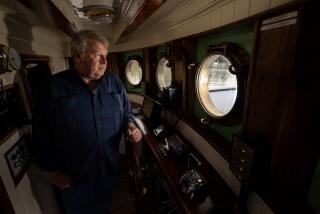Commericalism Washes Out ‘River Pirate’
- Share via
CUNARD, W.Va. — The old New River once raced through “Sleepy” Nutter’s veins and brought the world to his trailer’s door.
Before commercial white-water-rafting “outfitters,” paved parking lots and even riverside restrooms, thrill-seekers relied on James (Sleepy) Nutter’s old four-wheel-drive farm truck to ferry their kayaks, canoes and rafts into the gorge below his home.
“Sleepy’s Shuttle” was just the first adventure. Nutter guided many a boat through the rapids and never asked for more than gas money or a cold beer.
“I loved that river down there. I used to love to be down there fishing. I’d crawl out the window after my family went to sleep and I’d wake up by the river,” Nutter said. “When I was down on that river, I never did go hungry.”
Nutter is among the last of the river “pirates,” unlicensed rafting guides working West Virginia’s mountain rivers before white-water tourism became big business.
At 56, he is thin and wiry. The man laughs loudly and smiles wide, even though his wife Louella burned his false teeth by accident not so long ago.
These days, tourists streaming to the rapids in New River Gorge National River mostly bypass Nutter’s green and white trailer in Coal Run Bottom, a hollow about 40 miles southeast of Charleston.
Many are inexperienced boaters looking for a safe adventure, and they prefer the lure of the commercial outfitters and the National Park Service.
“For the past 13 years I helped every paddler in the world get down to the river,” Nutter said. “Now the only chance I get to make money on the river is taking two-day fishing trips down to camp.”
The rules of the river have changed.
Regulations designed to protect the park and river are enforced equally for tourists and residents. Nutter and his neighbors can no longer use dragonfly larvae for fishing bait, or pick berries and wild onions.
“Me and people like me who grew up on the river all our life, we can’t turn over a rock to look for bait without getting a fine,” Nutter said.
Nutter said boaters share his love of the river, and he was happy to paddle alongside when they started arriving at his hollow in the late 1970s.
“I just started out helping some guys who asked me to,” he said.
Boaters parked on Nutter’s land and loaded their gear onto his truck. He took off down the slippery, unpaved gorge road, with the boaters following on foot.
After unloading at the only low-water landing on this stretch of the river, he drove up and shuttled the boaters’ cars and trucks downriver about 10 miles to Fayette Station.
Then he hiked up the hill to the Red Dog Saloon, where he waited for them to give him a ride home.
Sleepy’s Shuttle became a legend on the river and beyond. Strangers would find their way to his trailer and greet him like an old friend.
“It’s something you’ve got to get used to, honey, because he’s famous,” said Louella, 44, his wife of three years. “When we first got married, I would just get so jealous. These girls in bikinis would just come up and throw their arms around him.”
Nutter’s father, who fed a family of 11 by loading coal into railroad cars, also made boats to rent to fishing parties.
Some of the fishermen would pay Nutter extra to row for them and show them the best spots for bass and catfish. He ran the rapids in his father’s boats and never wore a life jacket.
In the summer, Nutter camped on the New River for weeks at a time, taking along coffee, potatoes and canned corned beef. When he ran out of coffee, he boiled spicewood for tea, and he picked wild onions to cook with the fish.
Nutter’s parents were too poor to buy him glasses. His vision had deteriorated badly by the time he graduated from eighth grade and went to work. The Army turned him down and he failed vision tests at high-paying factories and sawmills.
Last year, the National Park Service graded the road down Nutter’s hollow and built parking lots below. It paved the mud-and-sand landing, put in restrooms and built stairways with slide rails to help get the rafts from parking lot to the river’s edge.
Now the big rafting outfits run their buses down the gravel road to the new “Cunard River Access.” Private parties can drive themselves down.
Sleepy’s Shuttle is no longer needed. Now the Nutters live on the disability payments he gets because of his bad eyesight. He says he has no complaints: They have enough to eat, and he gave up smoking and drinking around the time he and Louella married.
If Nutter is bored, he always is ready to rile a park ranger or tell a few stories to a visitor.
“This is one of the quietest summers I’ve been able to enjoy,” he said.
More to Read
Sign up for The Wild
We’ll help you find the best places to hike, bike and run, as well as the perfect silent spots for meditation and yoga.
You may occasionally receive promotional content from the Los Angeles Times.






